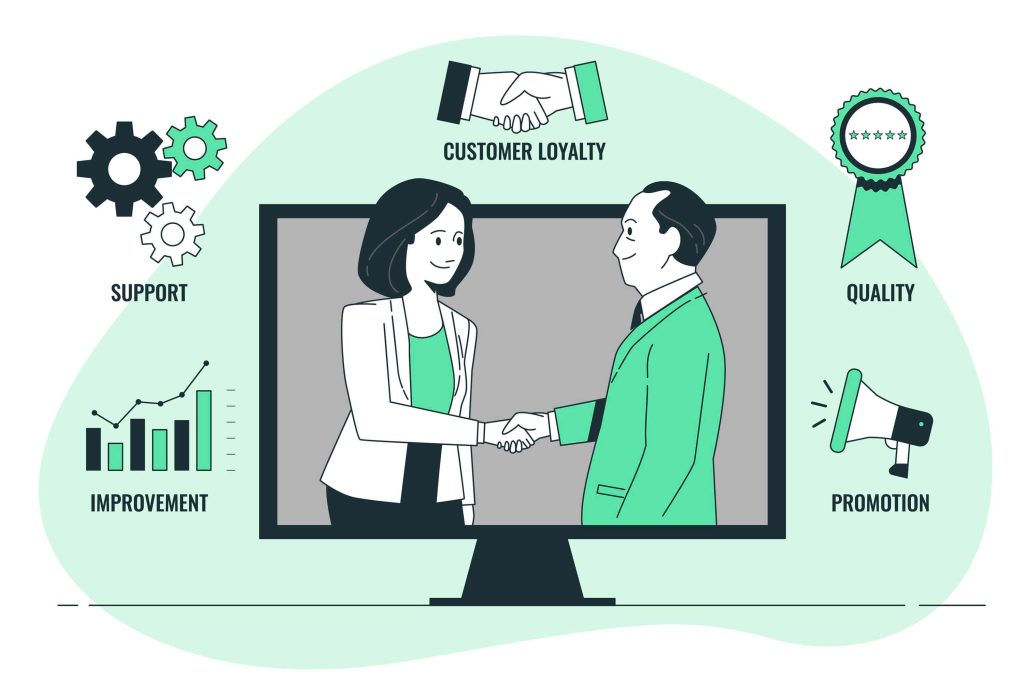The Importance of Customer Relationship Management Systems CRM in Businesses Today

In the dynamic realm of modern business, fostering robust customer relationship management systems and managing operations is a complex endeavor. This is where Customer Relationship Management (CRM) systems step in, becoming the cornerstone of effective customer support, streamlined processes, and data-driven decision-making. As companies strive to deliver exceptional customer experiences, the strategic use of these management systems can help navigate these challenges, spanning from email marketing and customer retention strategies to overall operational efficiency.
In this comprehensive guide, we’ll delve into how these systems help companies of all sizes manage customer relationships, drive growth, and achieve a competitive edge in today’s ever-evolving market.
What is Customer Relationship Management software?
At its core, CRM software is a technological solution designed to help businesses build, maintain, and strengthen relationships with both existing and potential customers. By collating a wealth of customer data and interaction history, these systems enable companies to better understand individual preferences, pain points, and needs. This, in turn, enables personalized interactions that foster trust and loyalty.

What does a CRM system do?
A Customer Relationship Management system serves as a multifaceted tool that streamlines various aspects of customer management and engagement:
- Contact Management: Seamlessly organize customer profiles, communication preferences, and purchase history, allowing for more informed interactions.
- Sales Automation: Facilitate the tracking of leads, opportunities, and sales pipelines, optimizing the sales process for increased conversions.
- Marketing Automation: Efficiently manage marketing campaigns, automate email outreach, and nurture leads through personalized content.
- Customer Service: Log and monitor customer inquiries and complaints, ensuring timely and effective support.
- Analytics and Reporting: Gain actionable insights from customer data, enabling better decision-making and the refinement of business strategies.
How Do I Get Started with CRM?
Embarking on your journey involves several pivotal steps:
- Needs Assessment: Define your business objectives, identify pain points in customer interactions, and outline the features necessary to address these challenges.
- Selecting the Right CRM: Research and compare various platforms, considering factors like scalability, customization options, and integration capabilities.
- Data Migration: Migrate existing customer data into the system while ensuring data accuracy and consistency.
- Customization: Tailor it to align with your unique business processes, configuring settings, data fields, and workflows.
- User Training: Provide comprehensive training to your team to ensure they can maximize the potential of the system.
What does a CRM for small business do?
Small businesses stand to gain numerous advantages from CRM systems:
- Holistic Contact Management: Store all customer interactions and data in one central location, fostering a deeper understanding of individual customer journeys.
- Lead and Opportunity Tracking: Effectively manage leads and track sales opportunities, preventing potential revenue from slipping through the cracks.
- Personalized Marketing: Craft and deliver highly targeted marketing campaigns, reaching the right audience with the right message.
- Enhanced Customer Service: Respond promptly to inquiries, provide timely support, and enhance overall customer satisfaction.
How does CRM make sales and marketing easier?
CRM systems significantly simplify sales and marketing endeavors through:
- Lead Prioritization: Identify and focus on high-potential leads, maximizing conversion rates and sales revenue.
- Automation: Automate repetitive tasks such as follow-up emails, lead assignment, and data entry, freeing up valuable time for more strategic activities.
- Targeted Campaigns: Utilize customer insights to create personalized marketing campaigns that resonate with specific audience segments.
- Data-Driven Insights: Leverage advanced analytics to derive valuable insights from customer behavior and engagement patterns, refining strategies for optimal results.
- Cross-Team Collaboration: Enable seamless collaboration between sales, marketing, and support teams, ensuring everyone is aligned and informed.
Why do companies use customer relationship management systems?
Companies adopt CRM software for a multitude of reasons:
- Strengthened Customer Relationships: Delivering personalized experiences cultivates stronger emotional connections and long-lasting customer loyalty.
- Streamlined Processes: Automating routine tasks minimizes manual errors and boosts operational efficiency, leading to improved overall productivity.
- Centralized Data: Having a unified repository of customer data eliminates data silos and ensures consistent, accurate information across the organization.
- Informed Decision-Making: Access to comprehensive customer insights empowers strategic decision-making, enabling businesses to stay ahead of trends and shifts in the market.
- Scalability: As businesses grow, CRM systems provide the scalability needed to accommodate larger customer bases and expanding operations seamlessly.
What Is an Example of Customer Relationship Management?
Salesforce, a globally recognized CRM provider, serves as an exemplary instance of CRM in action. Offering a comprehensive suite of tools spanning sales, marketing, and customer service, Salesforce empowers businesses to manage their customer relationships comprehensively and efficiently.
How much does a CRM cost?
The cost of CRM systems can vary widely based on factors such as the provider, features offered, and the number of users. Here are a few cost options:
- Free CRM: Basic CRM functionality with limited users, suitable for smaller businesses.
- Paid CRM: Subscription-based plans with extended features, customization options, and scalable pricing tiers.
- Enterprise CRM: Tailored solutions for larger corporations with intricate needs and high user counts.

FAQs
What are the 3 types of CRM?
Customer Relationship Management can be broadly categorized into three main types:
- Operational CRM: This type focuses on automating and streamlining day-to-day business processes such as sales automation, marketing automation, and customer service. It helps manage customer interactions and data effectively.
- Analytical CRM: Analytical CRM involves gathering and analyzing customer data to derive insights into customer behavior, preferences, and trends. This information guides business strategies and decision-making.
- Collaborative CRM: Collaborative emphasizes improving communication and collaboration between different departments within a company and fostering better interactions with customers. It enhances cross-functional teamwork to serve customers more efficiently.
What are the 5 components of CRM?
The components of CRM collectively contribute to a holistic understanding of customer relationships. The five key components are:
- Customer Data: Comprehensive and accurate customer information, including contact details, purchase history, and interactions.
- Sales Automation: Managing and tracking leads, opportunities, and sales processes.
- Marketing Automation: Designing and executing targeted marketing campaigns based on customer segmentation and preferences.
- Customer Service: Addressing customer inquiries, and complaints, and providing timely support.
- Analytics and Reporting: Utilizing data to generate insights that drive informed decisions and strategies.
What are the four basic types of CRM systems?
CRM systems can be classified into four fundamental types, each serving distinct purposes:
- Strategic CRM: Focuses on long-term customer relationship-building, customer loyalty, and maximizing customer lifetime value.
- Operational CRM: Centers on automating customer-facing processes such as sales, marketing, and customer service.
- Analytical CRM: Involves data analysis to gain insights into customer behavior, aiding in creating targeted marketing campaigns and personalized experiences.
- Collaborative CRM: Enhances communication and collaboration between different departments to improve overall customer interactions.
What are the 4 pillars of CRM?
The four pillars of CRM represent the core principles that guide effective customer relationship management:
- Customer Understanding: In-depth knowledge of customer needs, preferences, and behavior is essential for tailoring interactions and experiences.
- Customer-centric Processes: Streamlining processes around customer needs, ensuring seamless interactions from sales to support.
- Collaboration: Effective cross-functional collaboration among departments like sales, marketing, and customer service leads to consistent customer engagement.
- Technology: Implementing software and tools to automate, manage, and analyze customer interactions and data.
To Conclude – Enhancing Customer Relationships and Business Success with CRM Systems
In today’s rapidly evolving business landscape, the importance of effective customer relationship management cannot be overstated. A well-implemented system acts as the bedrock of a successful business strategy, enabling companies of all sizes to manage customer relationships with finesse and insight.
The best systems, like HubSpot CRM, serve as versatile sales CRMs that go beyond mere data management. They provide a comprehensive suite of features that cater to every stage of the customer lifecycle. By offering a single view of the customer, businesses can gain a 360-degree understanding of customer needs, behaviors, and preferences.
With cloud-based solutions, businesses can harness the power of superior customer engagement, as well as seamless collaboration among customer service representatives. These applications empower businesses to track customer interactions across channels, ensuring that customer needs are met consistently and promptly.
One of the most significant benefits of CRM software is its ability to improve customer service and support. By centralizing customer profiles and interaction histories, this system helps businesses anticipate and address customer needs effectively. This ensures that every customer interaction is personalized and tailored to their preferences, ultimately building customer loyalty.
For small businesses, this software can be a game-changer. It provides proper management of customer data, enabling these businesses to build customer profiles, manage leads, and provide exceptional customer services, all while staying within their budgets.
A well-thought-out strategy goes beyond data management; it equips businesses with actionable insights into customer behavior. This insight is invaluable for refining products, tailoring marketing efforts, and offering the best customer experience.
In the absence of a system, managing customer relationships becomes challenging, and essential details can fall through the cracks. A system ensures that customer data is not just stored but organized in a meaningful way. It creates a reliable database that serves as a source of truth for customer information.
The advantages of CRM software extend far beyond sales and marketing. Field service management software, a type of application, ensures that customer needs are met even after the sale. This end-to-end view of the customer journey is essential for building lasting relationships.
While exploring the vast landscape of options, businesses can opt for software as a service (SaaS) solutions that offer scalable and customizable tools. These CRM products integrate marketing automation, networking, or contact management, giving businesses holistic access to customer information in one unified platform.
In conclusion, the realm of these systems offers a multitude of benefits for businesses seeking to manage customer relationships more effectively across various touchpoints. With a well-implemented strategy and the right tools, companies can truly understand their customers, provide personalized experiences, and navigate the intricacies of modern customer engagement successfully. So, whether you’re a large corporation or a small business, embracing the power of CRM can undoubtedly pave the way for enduring customer relationships and long-term business success.





